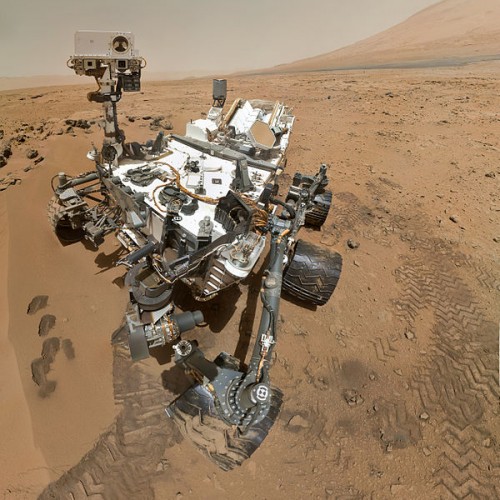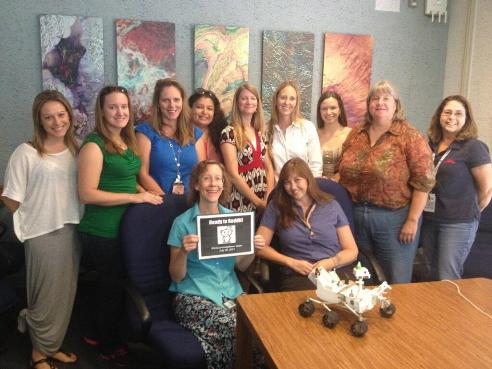 The first week in August was a big one for feminist Mars news (if I could design a beat…). August 6 marked the one-year anniversary of the Curiosity rover’s landing, and to celebrate, Mattel revealed Barbie’s 2013 Career of the Year: Mars Explorer.
The first week in August was a big one for feminist Mars news (if I could design a beat…). August 6 marked the one-year anniversary of the Curiosity rover’s landing, and to celebrate, Mattel revealed Barbie’s 2013 Career of the Year: Mars Explorer.
Mars Explorer Barbie (available in both caucasian and African-American varieties), with her shiny, pink accessories and a pink-accented Curiosity drawn into the background of her box, drew starkly divided reactions–she was both celebrated for potentially encouraging girls to go into science and damned for being too pretty and pink while doing so. Mattel said she’d encourage girls to “reach for the stars”; some thought she’d just keep encouraging eating disorders.
I played with dinosaurs, not Barbie, and I’ve never liked pink. So I hesitated to say anything on the matter–just like I hesitated when I encountered some real Mars women, hosting an all-female Ask Me Anything session on Reddit.

They were scientists, engineers, writers, and communicators, and they were all members of the Curiosity team from the Jet Propulsion Laboratory in California.
I wanted to write something highlighting the session, especially because nothing clearly designated it as an all-female event and because the conversation managed to stay focused largely on Curiosity, space, and science without devolving too much into the particularly disgusting brand of misogyny that tends to occur on the internet. A success all around.
But as I thought of the piece I might compose, it crumpled into disparate strands of cliches, another incidence of well-intentioned words dancing awkward circles around our collective discomfort with accomplished women. I didn’t want to reduce these women to their genders, to somehow lessen their achievements or mock their interests with another article that, despite of itself, screamed Don’t these girls know science is for boys? And it didn’t escape me that, were the situation reversed, and the AMA all men, I would have scoffed. I wouldn’t have hesitated to lament, loudly and publicly, yet another example of a male-dominated world, and to opine, somewhat uselessly, about how we need to encourage more girls to get into science—indeed, to reach for the stars.
So—to write, or to let lie? I thought of my imaginary article’s news value–was it newsworthy that 12 people talking about Mars were women? Perhaps. You could argue that calling an item “news” is synonymous with calling it “of interest,” and I imagined it would be of interest that any group of 12 people talking about Mars would be women. But why is it of interest? Because it is, well, unexpected. Because there is still a deeply pervasive assumption that science is for boys, and because science, at least in terms of those who get paid to do it, still largely is for boys, for reasons that span everything from cultural perceptions to the existence of the uterus in only one half of the human biology.
I was still unsure, so I emailed JPL, and ended up on the phone with Veronica McGregor, manager of news and social media at JPL. First, it’s worth noting that the AMA was intentionally all women, and that this fact was intentionally not highlighted. JPL had done AMAs on subreddits like TwoXChromosomes before, where the intention was to have a space for women and girls to talk about science. This was the first time they hosted an all-female conversation directed at a broader audience.
I told her that I was grappling with when, and how, to write about women and science. Can I be excited about women in science without making it seem like it’s, well, weird?
“It’s actually not that unusual for us,” McGregor assured me. “On the whole Mars operation team one night there was not a single guy on shift. We realized that every lead for every instrument and the operations team working that day were all women, and they took a picture and posted that to Reddit and it got a lot of really good reactions.”
The lead for every instrument! Good reactions on Reddit! The extent of my emotional reaction to this news was a bit shocking, and, frankly, a little embarrassing. I couldn’t tell if I was somehow proud of my side of the gender spectrum, or a little jealous that I wasn’t one of the women working that night, or a tad too excited that, at least in this one place on the West Coast, in this one corner of society, the distance from here to equality seemed to have been shortened dramatically.
I think it was a bit of all three, but also a bit of something that I had heard Elise Andrew, who runs the I Fucking Love Science Facebook page, describe when some of her millions of fans reacted with shock when they found out she was a woman. “A lot of people were kind about it, and they were surprised they had the same bias in themselves,” she told some CBS anchors. “They were saying, ‘I didn’t realize I had this, but I obviously do. I never dreamed that I was sexist in any way, I never dreamed that I had this bias, but it’s there. I thought you were a guy.'”
Alas, so did I.
__________
Laura Dattaro is a freelance science writer who particularly likes space, physics, and philosophy.
Photos: Curiosity takes a selfie – NASA/JPL; Twitpic of Curiosity AMA team – NASA/JPL
” I couldn’t tell if I was somehow proud of my side of the gender spectrum, or a little jealous that I wasn’t one of the women working that night, or a tad too excited that, at least in this one place on the West Coast, in this one corner of society, the distance from here to equality seemed to have been shortened dramatically.”
This is how I feel EVERY time I hear about some event like this.
And I think perhaps the key to women getting ahead and getting taken more seriously is to have more events that are presented wherein “nothing clearly designated it as an all-female event…”
Thanks for much for validating me! LOL